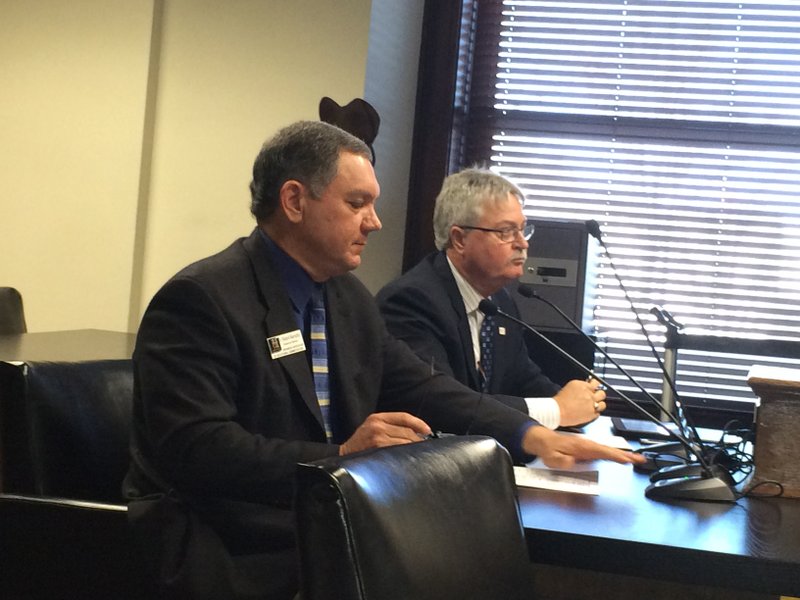Many Arkansas school districts are taking a wait-and-see approach to a recent federal directive instructing all public schools to allow transgender students to use the restrooms and locker rooms of the gender with which they identify.
State lawmakers have bridled at the directive and urged school districts and higher-education campuses to disregard the federal guidelines, calling the policy a federal overstep that lacks the force of law. Most school districts, meanwhile, have made no moves to adopt or reject the guidelines and see the debate as a nonissue.
"Right now it's just not that big of an issue in the state of Arkansas," said Richard Abernathy, executive director of the Arkansas Association of Educational Administrators. "I think the federal government's guidelines have kind of blown this out of proportion. There might be some areas in the nation that really have a significant issue with it, but schools in the state of Arkansas have just been quietly taking care of business."
Without concrete policies, schools have accommodated transgender students on a case-by-case basis in the past. Often, that approach includes allowing access to single-person faculty and staff restrooms.
At the beginning of this school year, Bentonville High School Principal Jack Loyd announced that some restrooms were "designated for students that might feel uncomfortable using other bathrooms," said Paul Stolt, Bentonville School District spokesman.
And the state's higher-education institutions have made similar accommodations for transgender students.
"Our institutions have always approached sensitive issues involving student privacy on a case-by-case basis," said Nate Hinkel, University of Arkansas System spokesman. "In light of [recent] events, we do not believe there is any need to change our careful approach or alter university policy related to these matters."
And with so few transgender students, school administrators say, a case-by-case approach can be feasible.
Figures on the number of transgender students in Arkansas schools are hard to come by. The U.S. Census Bureau does not measure gender identity, and no statewide survey has been done.
Some researchers, like the Williams Institute at the University of California, have estimated that roughly 0.3 percent of American adults are transgender, according to a 2011 paper.
But among adolescents in schools, the presence of transgender students may not always be observable. Transgender students often find Arkansas public schools an unwelcoming environment to begin the process of transitioning or to exhibit transgender traits, activists said.
Jeremy Woody, president of the River Valley Equality Center in Fort Smith, conducts a transgender support group twice a month. Since the organization began four years ago, Woody has worked with at least 100 transgender students from the western Arkansas and eastern Oklahoma region.
"We hear this a lot from local students: They aren't trying to transition in schools, because it's just too hostile of an environment to transition in," Woody said.
"There are a lot of transgender students. Some are brave and they just deal with the constant ridicule, some are just not that strong, and they only dress [according to their gender identity] whenever they're away from everyone. And there are some that don't dress [as their gender identity] at all because of their parents," Woody said.
Arkansas is not without a history related to the restroom use of transgender or homosexual students in schools. In 2012, University of Arkansas Fort Smith student Jennifer Braly, a transgender woman, sued the university over discriminatory bathroom policies.
Braly had been barred from using the women's restroom and had been given a key to use gender-neutral faculty facilities. The lawsuit compelled the university's administration to allow her access to the women's facilities and to change its policies regarding restroom use by transgender students.
In 2014, an openly gay student at a Van Buren junior high school was made to use separate facilities after peer complaints.
"Their actions to separate her, whether they had good or bad intentions, made everything worse. Because to the other students it says, 'she's different,'" Woody said.
A phone call from the American Civil Liberties Union to the school restored the student's bathroom privileges, Woody said, though not without inflicting humiliation. The student later transferred schools because of continued hazing and bullying, Woody said.
"The point is that it's segregating and demeaning no matter what," Woody said.
Some lawmakers, like U.S. Sen. John Boozman, R-Ark., think discussions should be had about the hostility some students face in academic settings. But the issue at hand is the legality of the directive from President Barack Obama's administration, he said.
"I think regardless of where a person is on the issue, the question is, 'does the president have the ability to arbitrarily decide how the whole country is going to progress on this?' And I simply don't think he's got that ability," Boozman said.
"The state needs to have the flexibility to do what they feel like to solve problems like this," Boozman said.
In issuing the guidelines May 13, the U.S. Department of Education threatened to withhold federal funding if schools or state education departments chose not to comply and disallow transgender students from using the restrooms of their choice.
Arkansas received nearly $600 million in federal education funding during the 2015-16 school year, according to data from the state Education Department.
A large majority of that money supports programs that benefit students of low-income families and is allocated by the state. For other programs, like the Small Rural School Achievement Program that helps rural districts increase academic achievement, funds are passed directly from the federal government to the school districts.
The federal funding, which amounts to more than 10 percent of the state Education Department's total revenue, could be at stake if state lawmakers forbid school districts from complying with the federal directive, as some have suggested. On Thursday, Gov. Asa Hutchinson said he expects the issue to be taken up by lawmakers during the 2017 legislative session.
While the guidelines do not carry the weight of law without Congress' approval, the U.S. Department of Education said it could employ "a range of enforcement tools" to withhold funding.
Metro on 05/22/2016


